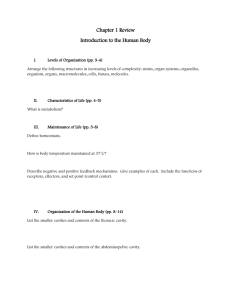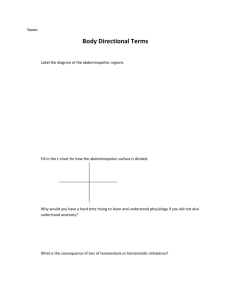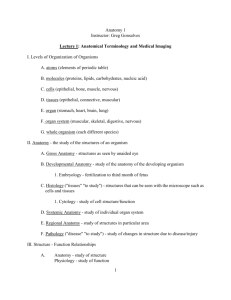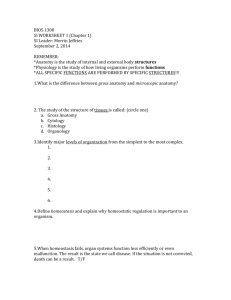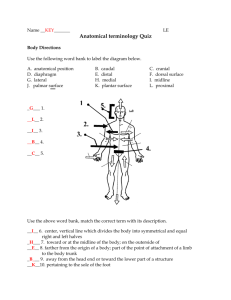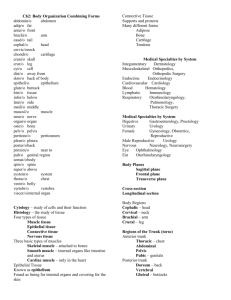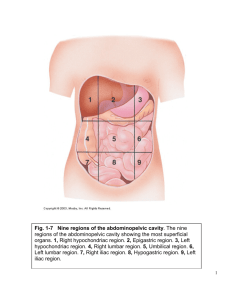Anatomical Directions & Body Cavities Worksheet
advertisement
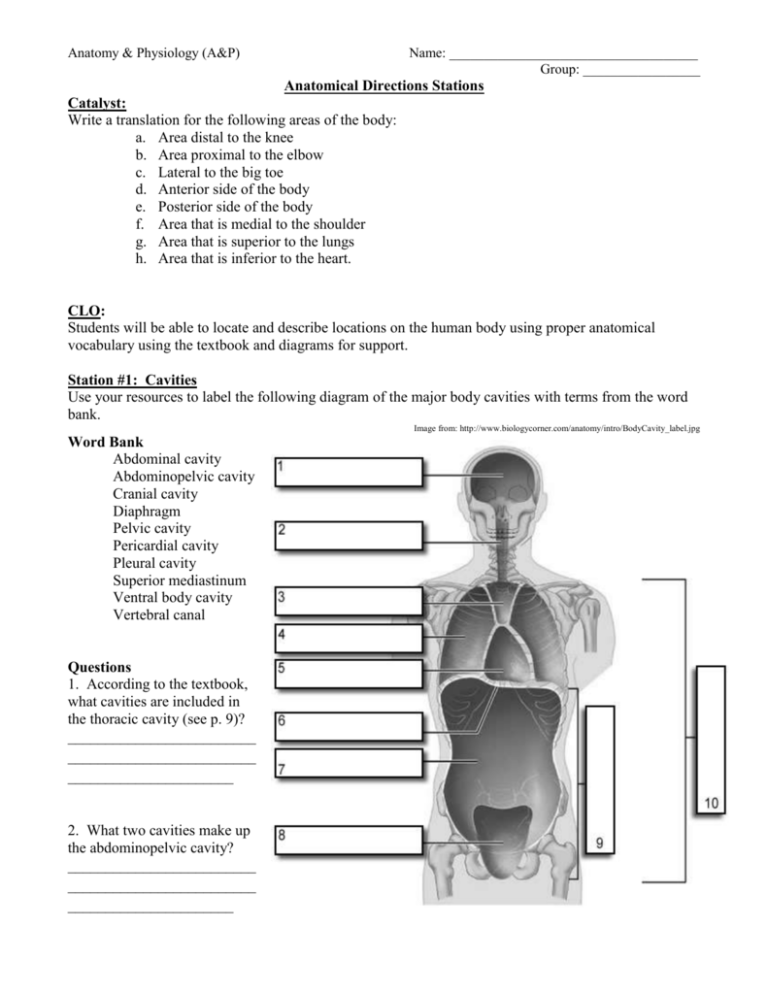
Anatomy & Physiology (A&P) Name: ____________________________________ Group: _________________ Anatomical Directions Stations Catalyst: Write a translation for the following areas of the body: a. Area distal to the knee b. Area proximal to the elbow c. Lateral to the big toe d. Anterior side of the body e. Posterior side of the body f. Area that is medial to the shoulder g. Area that is superior to the lungs h. Area that is inferior to the heart. CLO: Students will be able to locate and describe locations on the human body using proper anatomical vocabulary using the textbook and diagrams for support. Station #1: Cavities Use your resources to label the following diagram of the major body cavities with terms from the word bank. Image from: http://www.biologycorner.com/anatomy/intro/BodyCavity_label.jpg Word Bank Abdominal cavity Abdominopelvic cavity Cranial cavity Diaphragm Pelvic cavity Pericardial cavity Pleural cavity Superior mediastinum Ventral body cavity Vertebral canal Questions 1. According to the textbook, what cavities are included in the thoracic cavity (see p. 9)? _________________________ _________________________ ______________________ 2. What two cavities make up the abdominopelvic cavity? _________________________ _________________________ ______________________ Anatomy & Physiology (A&P) Name: ____________________________________ Group: _________________ Station #2: Visual Representation Complete the diagram using the work bank at the bottom of the page. http://www.anatomy.tv/StudyGuides/Images/SAM_Areas_Labelled_01.jpg Word Bank: Acromial Abdominal Antebrachial Brachial Calcaneal Carpal Cervical Coxal Cranial Crural Cubital Dorsum of foot Dorsum of hand Facial Femoral Gluteal Inguinal Interscapular Lumbar Nuchal Palmar Patellar Pectoral Pubic Popliteal Perineal Sacral Scapular Sternal Tarsal Thoracic Umbilical Vertebral Anatomy & Physiology (A&P) Name: ____________________________________ Group: _________________ Station #3: Translation For the word bank above translate the anatomical terms into their common names (for example, abdominal is commonly called belly). Use the lines to write in your translation. Acromial _______________ Abdominal ______________ Antebrachial _____________ Brachial ________________ Calcaneal _______________ Carpal __________________ Cervical ________________ Coxal __________________ Cranial _________________ Crural __________________ Cubital _________________ Dorsum of foot ___________ Dorsum of hand___________ Facial __________________ Femoral ________________ Gluteal _________________ Inguinal ________________ Interscapular _____________ Lumbar _________________ Nuchal _________________ Palmar _________________ Patellar _________________ Pectoral ________________ Pubic __________________ Popliteal ________________ Perineal ________________ Sacral __________________ Scapular ________________ Sternal _________________ Tarsal __________________ Thoracic ________________ Umbilical _______________ Vertebral _______________ Station #4: Study Skills Create flash cards based on the translations above! Ask Ms. J for the notecards if they are not already on the table. Station #5: Application Surgery Prep: you will need your best focus!! You do not want to be sued for malpractice. Know what you are going to do before you cut. These surgical incisions are permanent. Scarring is probable. Remember the anesthesiologist has given you only 8 minutes. Your patient requires multiple procedures. Please perform the following: 1. Appendectomy – deep lateral incision in the anterior RLQ of the abdominopelvic cavity 2. Cesarean section – deep lateral incision medial in the pelvic cavity 3-4 inches distal to the belly button 3. Amputation of left leg – incision distal to the knee joint, but 6 inches superior to the ankle 4. Carotid endarterectomy – vertical superficial to the right carotid artery (in the neck area) incision 2-3 inches from the medial plane of the trachea (throat area) Directions: Use the information provided to “make the correct surgical incisions” to perform the required surgeries. Write on the diagram to show where each incision goes (label location with the number).
